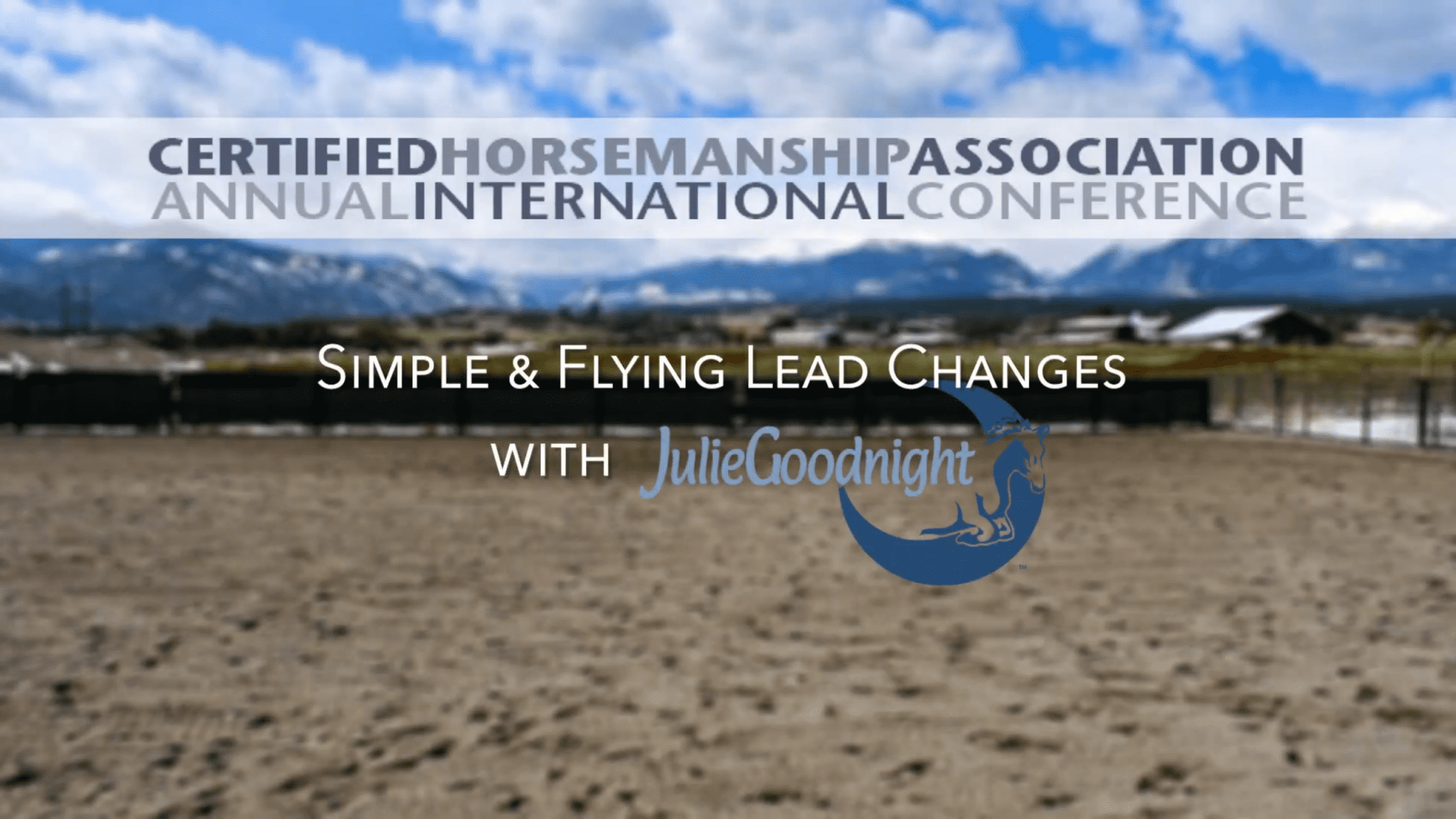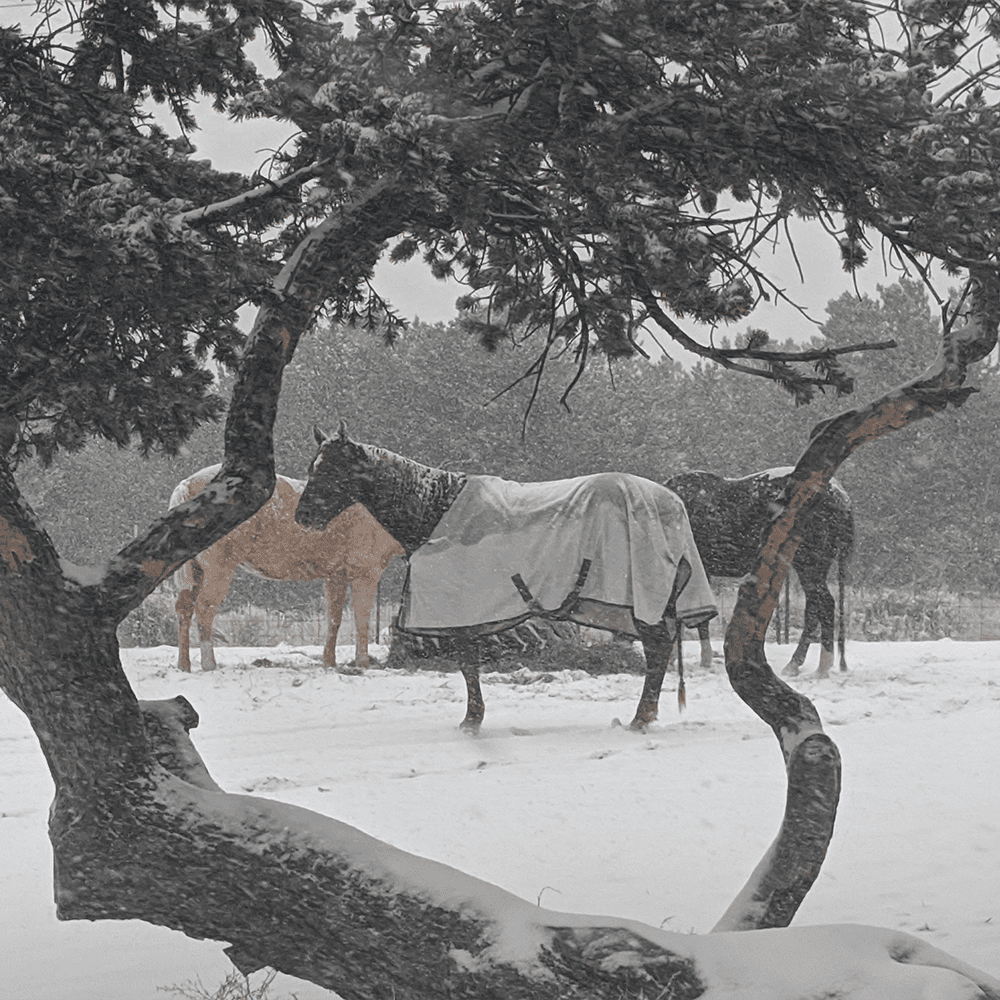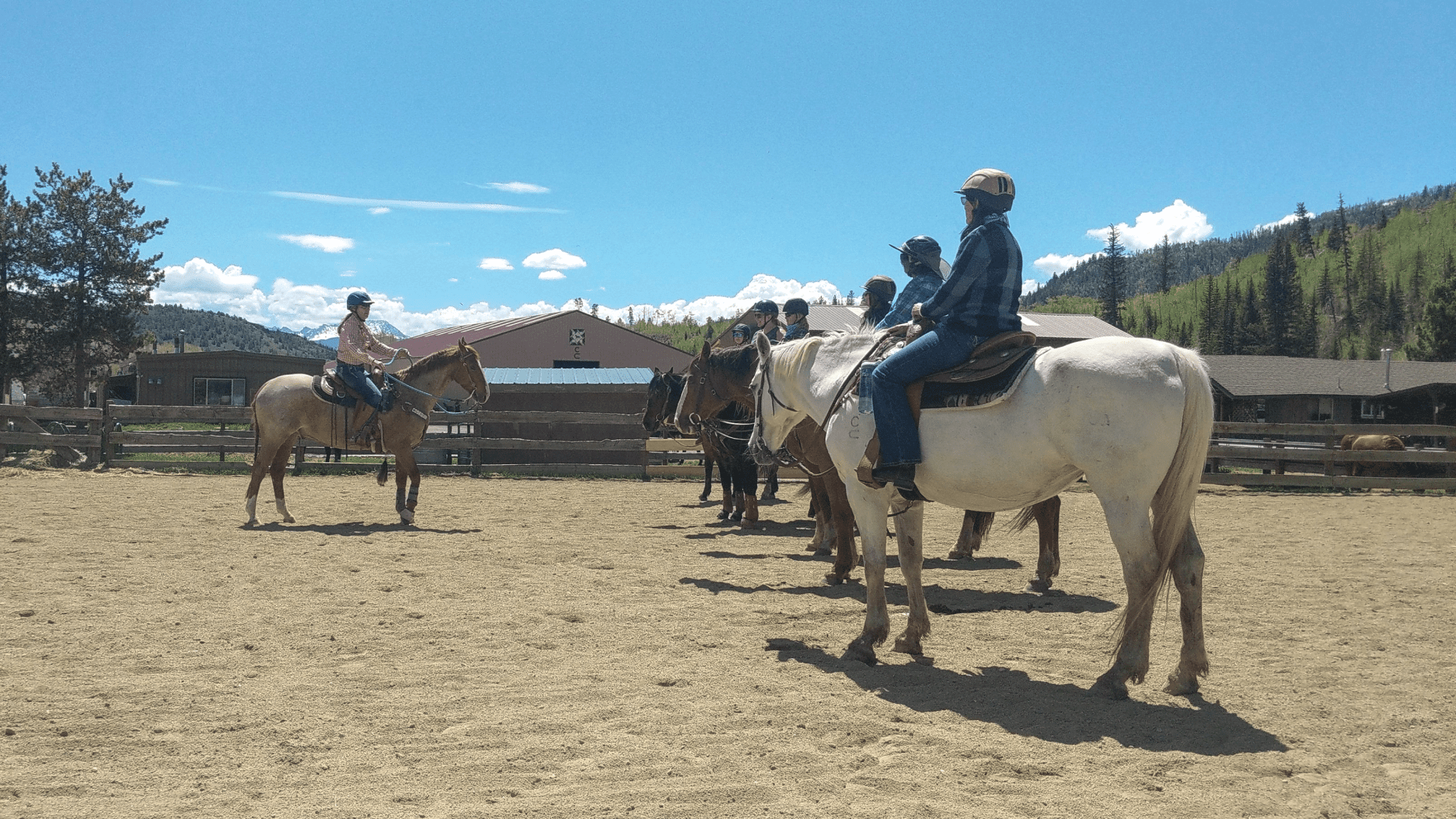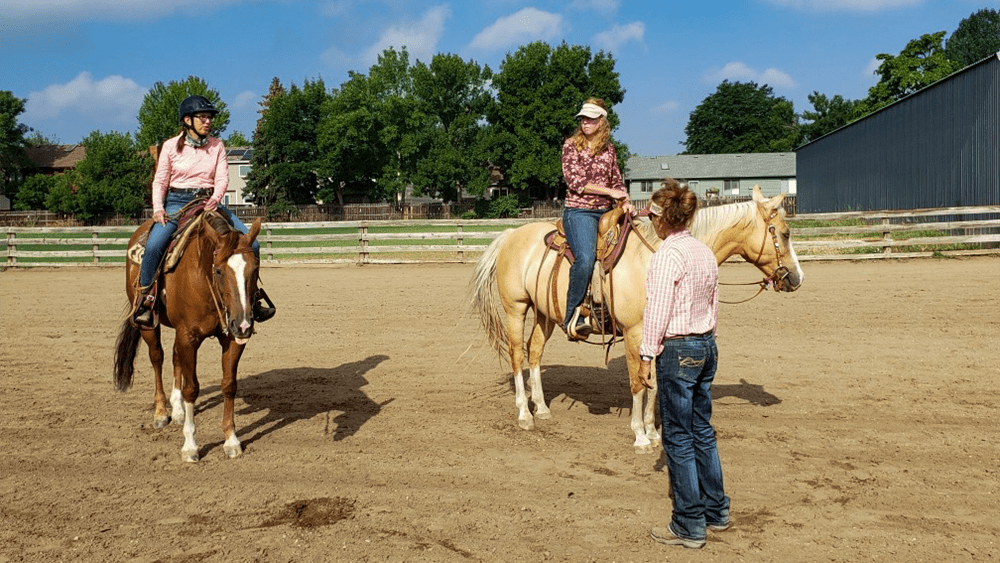In our small town in Central Colorado, the schools are small and organized—with different wings for different ages of students. The elementary, middle and high schools are all separate but nearby. In the past two installments of this series, I’ve written about how the elementary and middle schools remind me of the wings in my barn reserved for the young horses and for my prime-time horses who are at the top of their games. Then, in my barn, the third wing is for the aged horses.
The comparisons from the schools to my barn might just stop when it comes to this third tier. The school has a third building— the high school. My barn has a third wing— the “geriatric wing” as we call it. I don’t think I can easily compare young high school students to my aging horses. Both are seniors, both have been around the block (well, the high school seniors think they have), both are looked up to by younger generations, both have earned some respect.
But high school students have their lives ahead of them. My older horses are finished with adventure and have their life-long home. The third wing of my barn houses the horses who will have a place there until they leave this earth. In a quiet corner of the facility is our geriatric wing. We do what we can for these wise old horses, to make their final stage of life as comfortable as possible. They’ve given so much to so many riders over the years and I am happy to give them a noble and comfortable, albeit expensive, retirement.
In this three-part series, I have shared with you the horses that occupy each section of my barn, the behaviors we expect from that age group, how we focus our training, how we keep them fit and the specific health and nutritional needs of each age group. Last month I talked about the prime-time horses; this month, it’s all about our senior citizens.
Senior Citizens
Two elegant old mares currently occupy the geriatric wing of my barn: Pepsea, a stately Morgan who was my number one horse for many, many years; and Jewell, a frail little Anglo-Trakhener who carried many young riders to the winner’s circle and later taught hundreds of adult riders proper equitation. Both mares, by coincidence, are 28 years old and both have been in my barn for over 20 years. It will be strange when they are gone.
I’ve owned a lot of horses in my life; acquiring way more horses than I actually keep. Since I buy a lot of horses for resale and since the direction I have taken in my career has changed periodically, horses tend to come and go around here. I was taught from an early age that one horse may not suit your needs as your equestrian life grows and changes and that it was unfair to expect a horse to be good at everything. And you can’t just keep accumulating horses; some have to move on to other homes. Besides, in most cases when you have outgrown a horse, he is better off going to a rider and a situation for which he is more suitable.
But there have always been those special cases– those horses that are so precious that they remain with you until the day they draw their last breath. I’ve had quite a few in my life, starting with my very first horse, Minnie, who laid down and died peacefully in the barn after decades in my family. I had long since moved onto a younger, bigger and more suitable mount for my jumping and horseshow-crazy teen years, but Minnie always had a special place in my heart.
Pepsea and Jewell were definitely keepers for me and by the time I no longer needed their services, they were too old to risk losing track of. I didn’t dare think of selling them. Once they were ready to kick back and semi-retire, I had them out on free leases to near-by, hand-selected riders who would pamper them and work them lightly and where it was easy for me to monitor their care.
Now both mares are permanently retired from riding and are living out their twilight years with the two things horses want most in life: security and comfort.
Behave Your Age
My senior horses have worked hard all their lives– from a young age they were trained to carry riders and to help them accomplish their equestrian goals. They’ve been ridden for thousands of hours and carried riders over all sorts of terrain and helped them pursue their interests. They’ve been trained in many disciplines and adjusted to the quirks and demands of many riders.
At this stage of life, the hard work is over and they deserve to rest on their laurels. They are ready to kick back and relax and enjoy the simple things in life (eating and sleeping). Their bodies are failing them– there’s sagging where there didn’t used to be, the joints are plum wore out and their minds aren’t quite as sharp as they used to be. They’ve earned their status and both the humans and horses around them recognize that they deserve respect and peace.
The senior horses love bathing in the sun and waiting for the next meal. Exercising is not a high priority since they are dealing with the many aches and pains that come at the end of an active life.
Although the senior horses are ready to kick back and take life easy, they do not want to be disregarded and “put out to pasture.” They remember the ‘good ole days’ when they were athletes in their prime– important and catered to– and they aren’t quite ready to give that up. They like to feel needed and wanted.
Training Focus
The senior horses certainly are not in any need of training. They know more than most of us could ever hope to know about humans and the sport riding. They can analyze humans more efficiently than Dr. Phil or Judge Judy.
Becoming a senior citizen sort of sneaks up on you. One day you are the cat’s meow, at the pinnacle of your career– working hard, getting all sorts of perks and accolades, and the next thing you know, you’re being passed by. Hmm, that’s a lot to think about.
The transition from prime time to senior is subtle. When exactly it happens varies greatly with the horse’s breeding, history, conformation, temperament, training and soundness. Generally in the late teens or early twenties horses are slowing down and ready to shift towards retirement, although some horses go much longer.
For my mares, by the time they were 20-22, they were ready for a break. I transitioned them from a full-time working career to a semi-retired, easy-riding life. I made sure they were with riders who would appreciate their wisdom and not make big demands on them. But at some point, I had to make the decision to fully retire them. Since no human knew them better, it was up to me to know when it was time.
Older horses that have worked hard all their lives and been important to people, do not do well to be put on a back shelf and disregarded. We like our old mares to know that we still think they are important, even though we no longer ride them. For this reason, they still get groomed and exercised and paid attention to on a regular basis.
Fitness
At no stage of life is fitness more important or more difficult to manage. Understandably, later in life, body parts change. Joints are flat worn out and the mind tends to wander. Sounds familiar, doesn’t it? Keeping a geriatric horse fit and sound of mind and body is quite a challenge.
A low back and weak abdominal muscles are the hallmark of a geriatric horse and depending on the horse’s conformation and use, this may happen sooner or later. That’s why we try to keep a horse under saddle as long as he can take it– in order to keep him fit and his back strong and give him a sense of purpose.
Once riding is no longer an option, we try to keep our older horses strong with exercise in the form of turnout and hand-walking. Forcing exercise on an older horse is not always advisable and traditional methods like longeing are too hard on their bodies. Instead, leisurely walks, munching grass and looking at different surroundings, keep them fit both physically and mentally.
I prefer to keep my older horses together and separated from the younger, friskier horses whose idea of a good time might be chasing subordinate horses around. My senior horses deserve a break and protection from the sometimes stressful life in the herd. They don’t necessarily want to be alone, but they don’t want to be looking over their shoulders for bullies either.
Health and Nutrition
Senior horses have very special needs regarding health and diet. My main goal is to keep them safe, comfortable and happy. A horse’s teeth grow constantly all of his life until he reaches the age of 27-28. This allows him to grind the tough forage that he eats throughout his life but at some point, his teeth wear away and he no longer can grind his food as well as he used to. In nature, this would signal the slow end to his life but with the modern advancements in livestock feeds and medicine, we are able to keep horses healthy and alive much longer.
I try to keep horses on a high-quality grass hay as long as possible (alfalfa is too hard on them metabolically), with a modest amount of oats to carry the supplements they need to stay healthy and comfortable. Once their teeth give out, we start feeding them soaked grass pellets– a delightful mash that keeps their bellies full without all the hard work of chewing.
As horses age, they get skinnier and lose muscle mass and in our climate, with long, cold winters, we always blanket them in the winter to give them extra protection from the cold that they no longer get because they are so lean.
The most important supplement my geriatric horses get is Cosequin— for their joint health. Arthritis is a normal part of aging and the harder a horse has been used, the more his joints wear out; the more we protect his joints early in life, the longer they will last. We monitor our seniors closely to make sure they can lay down and get back up and that they have a comfortable and soft place to lay down and sleep. Many geriatric horses prefer to get off their feet and rest more often than younger horses, so it is important that they can get back up easily. In my experience, Cosequin keeps their joints healthy longer and allows them to get up and down easier.
My older horses are also on Proviable-EQ, a yeast based probiotic plus prebiotic product, which aids in their digestion and helps make the most out of their expensive feed. The yeast in Proviable-EQ support the process of digestion and absorption that is fairly unique to horses. Proviable-EQ supports the good bacteria that aid in digestion and compete with the harmful bacteria for colonization.
My seniors are also getting WelactinEquine every day– an Omega 3 fatty acid fish oil supplement-– which promotes cardiovascular health. As horses age, their circulation is sometimes compromised– legs stocking up and a fluid build-up on their under-line. The Welactin Equine helps with circulation and the added fat helps keep them in good flesh with a healthy coat. Welactin Equine also supports the respiratory system, joint health, and immune function of all horses. This is especially important in geriatric horses who need extra support of their overall wellness.
Horses give so much to us throughout their long lives. When I think back over the more than 20 years I’ve spent with these two mares– the adventures we’ve lived through, the memories we’ve shared and the blood, sweat and tears; I know how fortunate I’ve been to have them in my life (and many other riders that have come through my barn).
I want nothing more than to keep them safe, comfortable and happy and honor their lives. I am fortunate to have the resources to care for them at the level they deserve and it is an obligation I take seriously. One day it will be time to let them go and I’ll know when that time comes. I’ll do my best to reduce their suffering and make the end of their lives honorable and pain-free.
Caring for horses has its own challenges in each stage of life. We all start out as precocious youngsters and hopefully,we live a long, productive and comfortable life. It is important to me to offer the best that I can to my horses, in whatever stage of life they are in. After all, it is the least I can do, considering all that they have given me.
Enjoy the ride,
Julie
Update: We lost Jewell on June 5, 2013 at the ripe old age of 28. She was truly a golden girl—a wise old lady who will be missed.
Sidebar
Watch Horse Master Online
Julie Goodnight’s top-rated horse training show on RFD-TV is now available online, with valuable training videos available whenever you need them. With well over 100 episodes covering different horse training topics, you’ll find video lessons on almost any topic from halter training a 2-month-old filly to flying lead changes. Twenty-four new episodes are added each year, so you’ll have access to the latest shows, too. You’ll see Julie’s one-on-one help in each show as she helps a different horse and rider achieve horsemanship goals in any discipline. Visit http://TV.JulieGoodnight.com for more information.
Julie Goodnight’s top-rated horse training show on RFD-TV is now available online, with valuable training videos available whenever you need them. With well over 100 episodes covering different horse training topics, you’ll find video lessons on almost any topic from halter training a 2-month-old filly to flying lead changes. Twenty-four new episodes are added each year, so you’ll have access to the latest shows, too. You’ll see Julie’s one-on-one help in each show as she helps a different horse and rider achieve horsemanship goals in any discipline. Visit http://TV.JulieGoodnight.com for more information.
For more about Julie Goodnight’s training, watch her whole library of training advice and topics with her new online video channel (http://tv.JulieGoodnight.com) or catch Horse Master broadcast on RFD-TV every Monday at 12:30 and 10:30p EST – Direct TV channel 345, Dish Network channel 231 and on many cable outlets. Visit http://juliegoodnight.com/clinics for the clinic schedule. Sign up for the free monthly newsletter at: http://juliegoodnight.com/emailsignup.php. Goodnight is proud to recommend Myler Bits, NutramaxLaboratories, Circle Y Saddles, and Redmond Equine. Goodnight is the spokesperson for the Certified Horsemanship Association.
Please visit Goodnight’s sites for more information and training tips:
http://www.juliegoodnight.com
http://www.horsemaster.tv
http://www.juliegoodnight.com
http://www.horsemaster.tv



